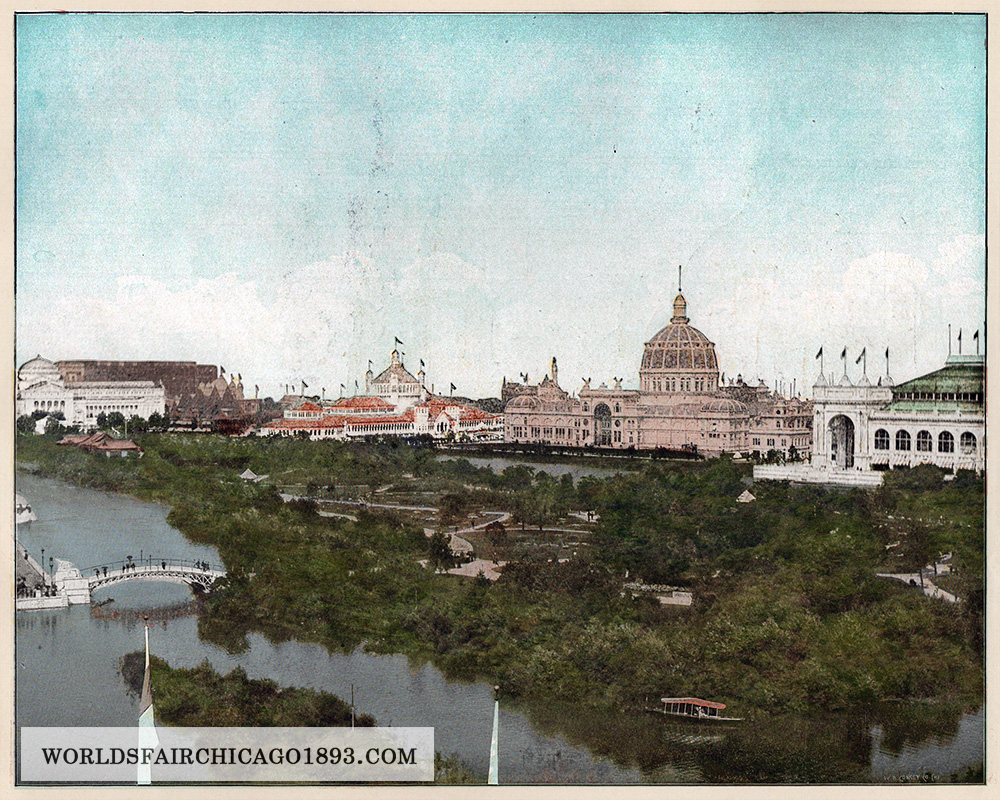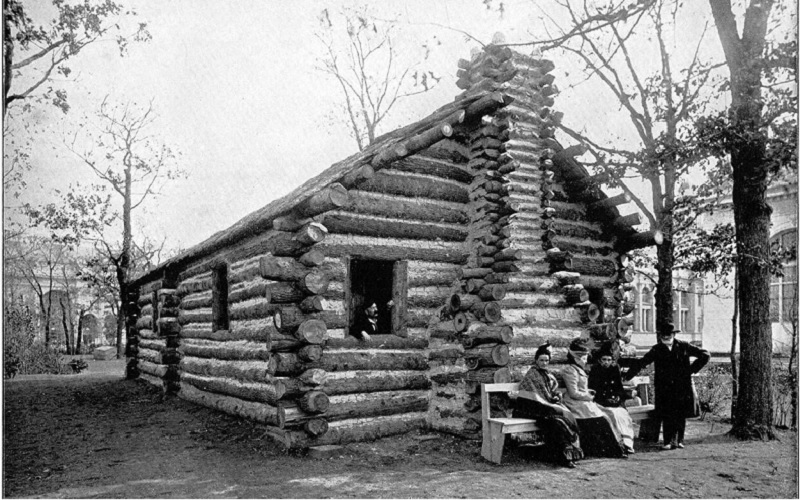
Many visitors to the World’s Columbian Exposition in Chicago on June 9, 1893, were eagerly trying to spot the Infanta Eulalia, the visiting Princess from Spain, as she toured the White City and Midway Plaisance. Meanwhile, just off the south end of the Wooded Island, a direct descendant of the legendary pioneer Davy Crockett (August 17, 1786 – March 6, 1836) visited the quaint Hunter’s Cabin.
Sponsored by Theodore Roosevelt and his Boone and Crockett Foundation and designed by prolific architect Charles Atwood, the Hunter’s Cabin was a replica of a typical pioneer house from 1850s and contained a display of relics of Davy Crockett, along with hunting gear, skins of wild animals, and furniture. “No matter how long one may have wandered through the vastness of the far West, and no matter how many cabin homes one has seen in such wanderings,” wrote the Chicago Tribune (Nov. 27, 1892, p. 33.) “this cabin on the island at Jackson Park will stop the traveler to the World’s Columbian Exposition.”
A reporter from the Chicago Times caught up with the Crockett descendant (his name is not given) and a fellow traveler during their visit to the cabin and wrote about it in the paper’s June 10 issue, reprinted below. The amusing story reminds us that much in the White City was an illusion, easily punctured by cracks visible in the plaster coating of “marble” buildings and statues … and by an errant department-store price tag on “relics” of an American pioneer.
The Hunter’s Log Cabin stood on a small island just south of the Wooded Island. [Image from The Dream City. A Portfolio of Photographic Views of the World’s Columbian Exposition. N. D. Thompson, 1893.]
Crockett’s Snug Cabin
Pretty Nest of Pioneer Comfort in the Midst of Gorgeous Outlay
An old man gratified — Descendant of Davy Crockett Rejoices in a Sequestered Nook — Scales Drop from His Eyes — Modern Price Mark on a Shovel and a Gasoline Stove Dispel the Illusion
A lineal descendant of Davy Crockett visited the fair yesterday in company with Col. B. A. Johnson, who is the last lineal descendant of the famous Yon Yonson.
Naturally these two old pioneers bent their steps toward the wooded island where nesting in its bower of leaves the hunter’s cabin offers cool and smoky retreat for the tired traveler. The cabin is an exact reproduction of a hunter’s hut, and all the interior furnishings are of the most realistic nature.
Col. Crockett looked about him with an air of extreme satisfaction and inhaled deep draughts of the welcome smoke-laden air.
The ruse hearth, the well-worn saddles and guns, the tattered fur rugs, and the canvas-covered bunk, all were the perfection of rude simplicity, and Col. Crockett remarked to Col. Johnson that it did him proud to see that in the midst of all the lavish outlay and gorgeous disregard for cost a place had been provided where a man of simple, homely tastes could spend a quiet hour in contemplation of the good old days.
Just as Col. Crockett remarked this, and while a young lady who had been educated abroad was saying that the cabin was so natural, his eagle eye fell upon one of the improvised articles of furniture.
Glamour soon wore off.
“Oh, this is too bad,” he ejaculated, pointing to some lettering which showed on the side of a box under a carelessly flung fur robe. The lettering was quite plain and seemed to indicate that the box had at one time contained shoes, which were the property of Montgomery Ward & Co.
“Didn’t the people who built this cabin know that Montgomery Ward & Co. were not in existence when my ancestor inhabited a cabin like this?” inquired the colonel, hotly, “and even if they had been, Davy Crockett wouldn’t have worn their shoes because he didn’t wear any at all. I protest against such glaring inaccuracy.”
And now the descendant of the immortal Crockett, which his peace of mind unhinged by this discovery, looked about him more sharply, and when he became aware of a shovel with the price mark still adhering to it and a gasoline stove his mental distress was almost too deep for words.
“Come away,” he said to Col. Johnson, laying hands on him to remove him by force if necessary. “Come away before we find out that the reindeer horns are made of wood and the guns on the wall are only painting. I’m going to protest to the man who runs this fair against having all my finer feelings outraged in this manner. I shouldn’t wonder if those snowshoes were papier mache.
“The Descendant of Crockett Was Shocked” [Image from the Chicago Times, June 10, 1893.]

